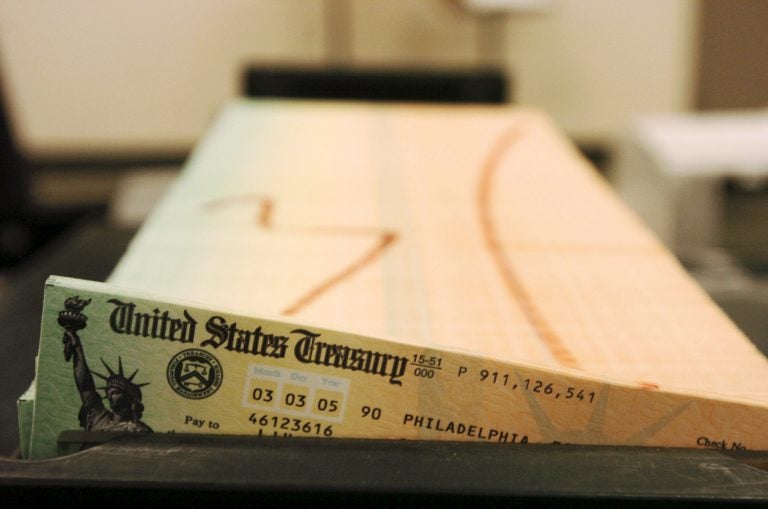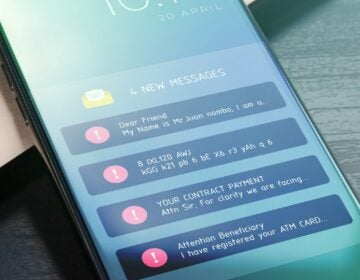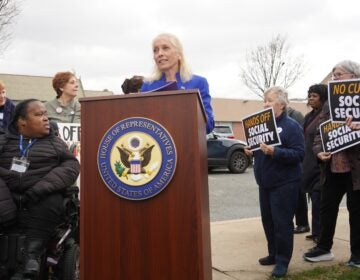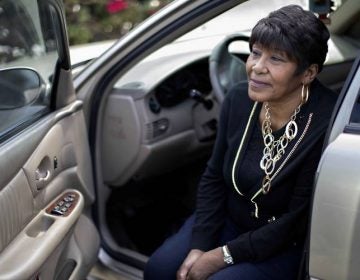Finding true social security while waiting at Two Penn Center
We were still getting used to our new status: retired.

In this file photo, trays of printed social security checks wait to be mailed from the U.S. Treasury's Financial Management services facility in Philadelphia. (Bradley C Bower/AP Photo)
We were still getting used to our new status: retired. One day in February, we did three things we had never done before:
- We rode our local commuter train into Center City for free using our new SEPTA Key passes.
- We attended an open rehearsal of the Philadelphia Orchestra at 10:30 in the morning.
- We went to the Social Security office to sign up for Medicare Part B. We had looked forward to the first two. The third, not so much.
The Social Security office was in Two Penn Center, just above Suburban Station. Entering the lobby, we saw in the far bank of elevators multiple signs, in very large print, making clear that Social Security was on the 20th floor and that only one elevator, the one on the end, would go there. (Someone wanted to be sure that none of the Social Security visitors might accidentally get in one of the other elevators. Whether that someone was the Social Security office or the other offices in the building was unclear.) Access to the elevator was roped off to create a waiting line, with a guard at the elevator door instructing those in the line not to push the “call” button. The elevator would go up and down of its own accord. We had to wait two rounds before we could board the elevator.
When the doors opened on the 20th floor, we came upon another roped barrier, this time dividing the elevator bay into two lines: stay right and go down a hall for Social Security cards (no one in that line); stay left and go straight ahead for benefits (everyone in that line). The faces in the line were brown, black, white, ivory, mocha, teak. Mothers with babies. Old men grasping a youthful arm. Couples looking anxious, just like us. Ahead, two guards flanked a large STOP sign. The guards allowed only one person at a time through the entrance to the office itself. Once permitted through the entrance, we were stopped again, this time at a metal table with another guard inspecting purses and packages. “Any firearms? Knives? Mace? Pepper spray?”
Having then cleared all the guards, we stood in one more line. The sign said, “Check-in at Window #5,” but Window #5 was closed and everyone was checking in at Window #4. We did, too. The clerk gave us a slip of paper with a number on it, just like at PennDOT license centers, and we made our way to two seats. The rows of metal chairs faced an LED screen that advertised various ways you could connect with Social Security other than visiting this faded, gray room. At the bottom of the screen, a crawl displayed multiple numbers currently being served: A1, B108, C66, M22. A taped voice announced that numbers may not be called in order, everything depended on what service was needed. Whenever a cell phone rang, the voice repeated, “All cell phones must be turned off.” On the wall above another metal table displaying pamphlets and flyers hung over-large framed pictures of the president and the vice president. The pictures look Photoshopped, the teeth bared in painfully white grins.
Most sat in the room quietly while numbers were called out and people traipsed off down a hallway. Occasionally, a low murmur arose from the very back of the room, coming from what looked like a pile of blankets but was in fact an elderly person, gender undetermined, wearing several coats and a knit hat. A guy at the front of the check-in line raised his voice: “I am going to report you! I am going to report you for not doing your job!”
Directly in front of us sat an older couple, i.e., older than ourselves. They kept turning to each other, looking more and more agitated and speaking in strained voices in what sounded like Japanese. With the slip of paper gripped in his hand, the husband stood and approached a woman sitting at the end of their row. Dressed in a soft cream sweater and faded jeans, the woman wore a coral scarf in contrast to her shiny black braids. Putting her book down beside a battered bag, she smiled and stood up. In very broken English, the husband, who barely reached her shoulder, asked her what they were supposed to do. He was clearly worried. Many people had been called to go to a help window, and they hadn’t been. The woman gently took the slip from his hand and looked up at the screen. “Your number is B113,” she said carefully. “It hasn’t been called yet. Don’t worry, they will call your number.” She repeated the last sentence for assurance and returned the slip of paper. He returned to his seat.
The room again sank into relative quiet. More numbers were called. “B110, go to Window #12. C69, go to Window #18.” The husband whispered something to his wife, stood up again and headed to the restroom at the back. A minute later: “B113, go to Window #20.” Then a second time, “B113, go to Window #20.” The woman at the end of their row raised her head, looked at the wife sitting alone, and went over to her. Bending down, she said, “That is your ticket. B113.” The wife clearly did not understand English, and confusion swept over her face. The woman helped the wife to stand and put her arm around her shoulder as though comforting a lost child. “Where is your husband?”
By this time, the room had come to life, heads swiveling to watch the quiet B113 drama. A young man called out, “He went to the men’s room.” And like volunteers passing water buckets down a line, voices carried the message over rows of seats. “Yes, men’s room.” “Men’s room.” The woman slipped her hand under the elbow of the wife. “Don’t worry. I will walk you down and your husband will come to join you.” The wife must have heard the help in her voice and started to walk. At that moment, the husband came out of the men’s room. Someone pointed him toward the woman and his wife. We all now watched as the man rejoined his wife, who was relieved, as were we all. The woman stepped away as the wife reached for her husband, who nodded his head in gratitude several times before they made their way down the hallway to Window #20. The woman in the soft cream sweater and coral scarf returned to her seat at the end of the row, and the rest of us returned to our own small concerns, comparing the numbers on our slips to the numbers on the crawl.
And it was over, that moment of grace, that moment of true social security in action.
WHYY is your source for fact-based, in-depth journalism and information. As a nonprofit organization, we rely on financial support from readers like you. Please give today.





